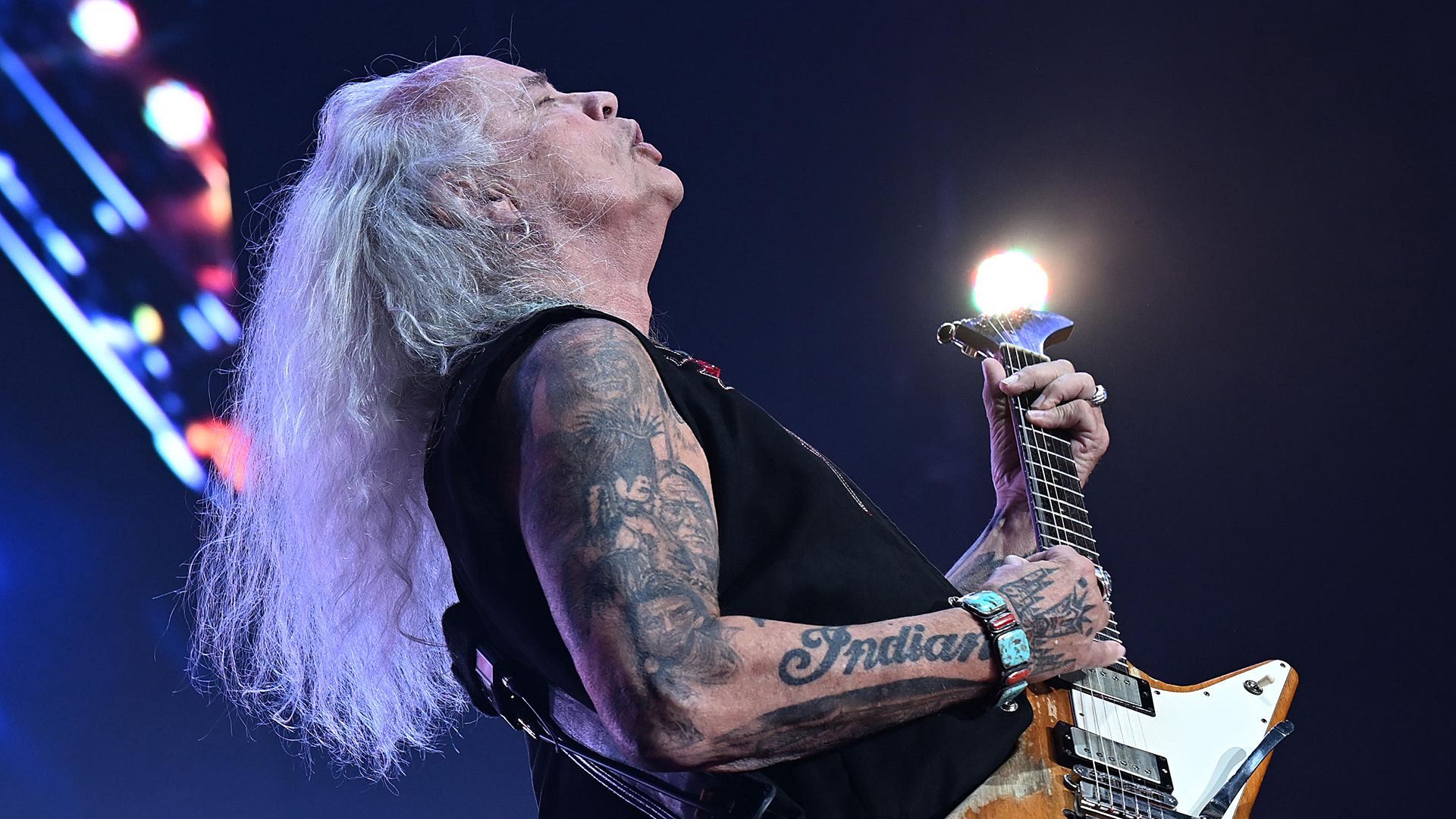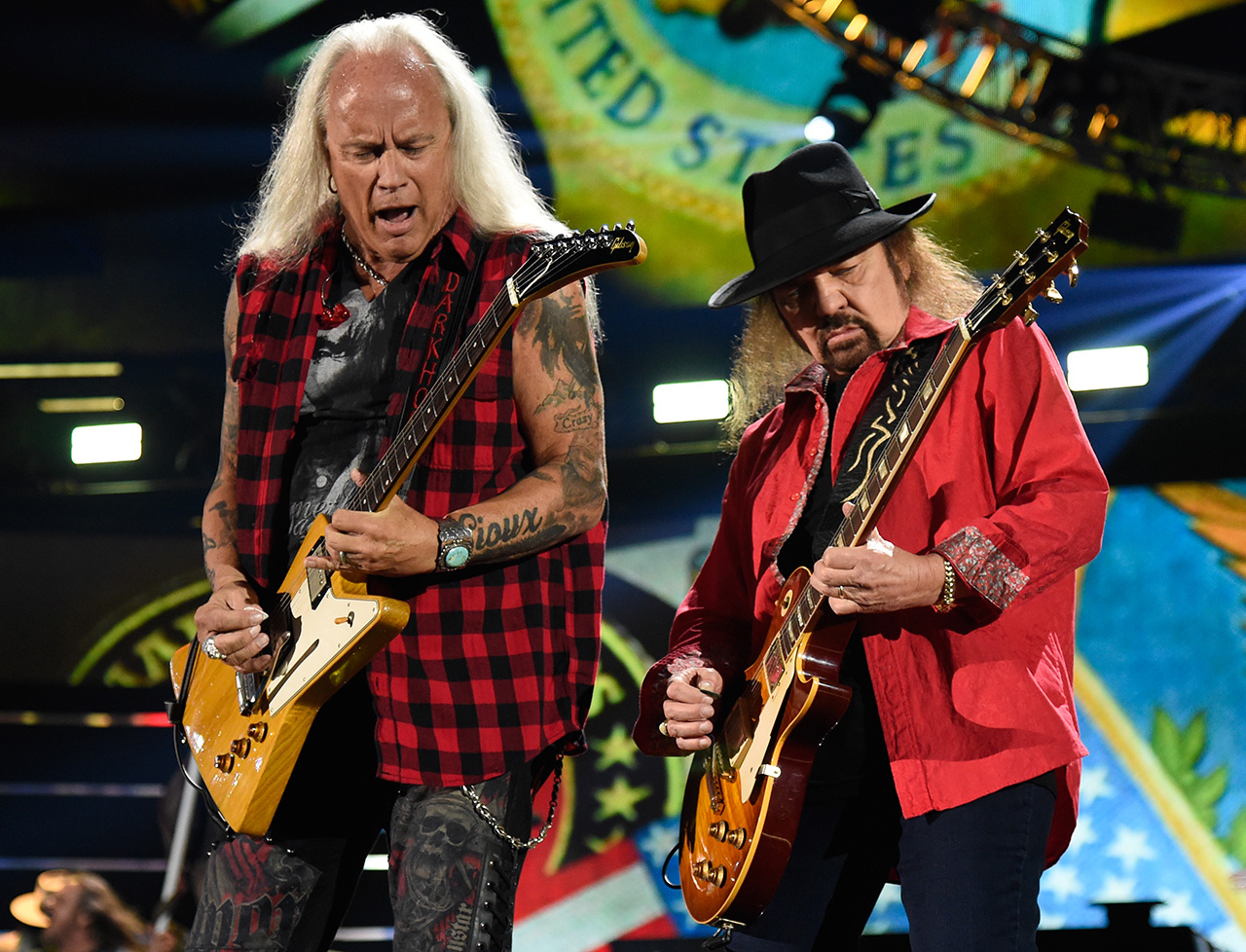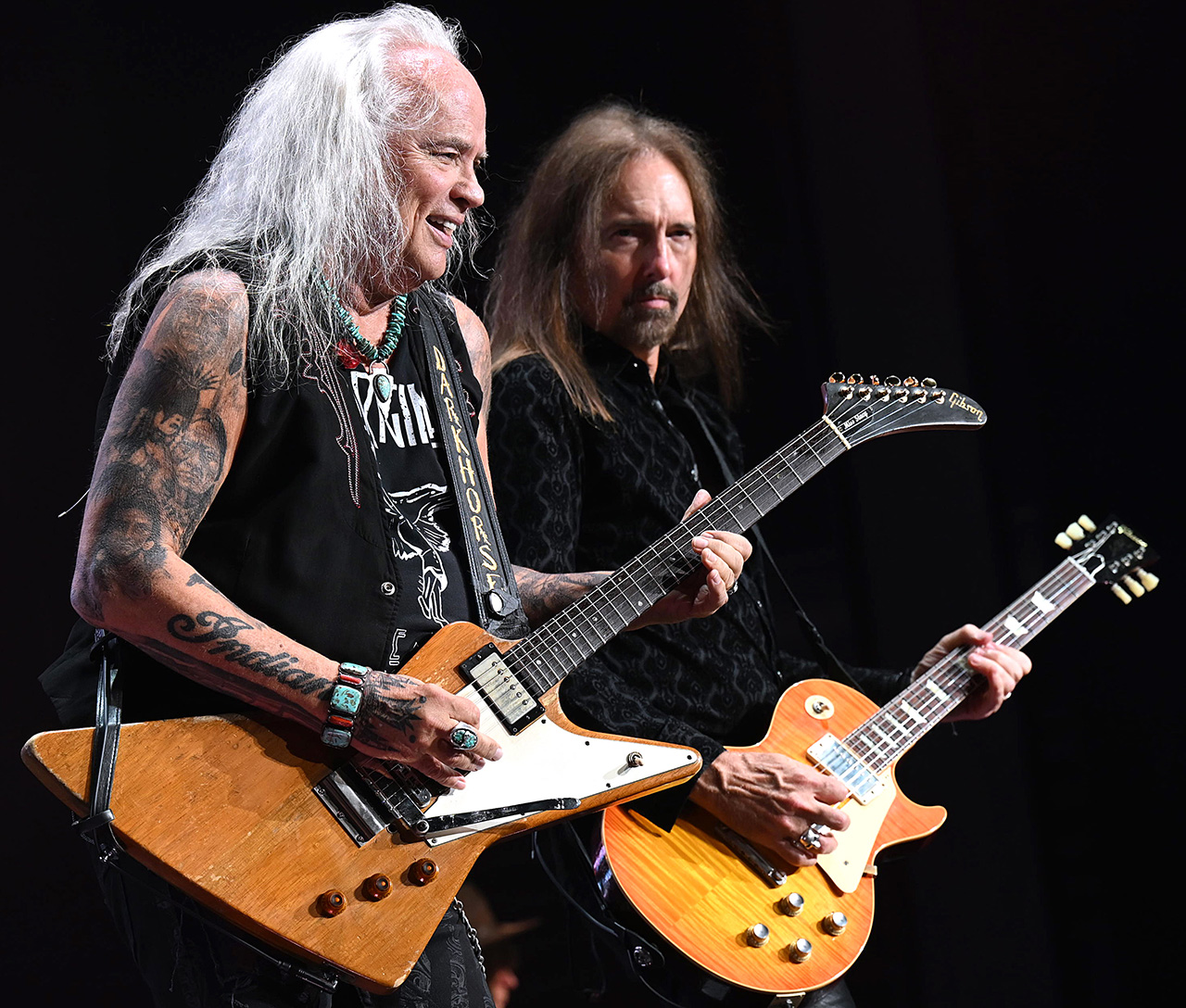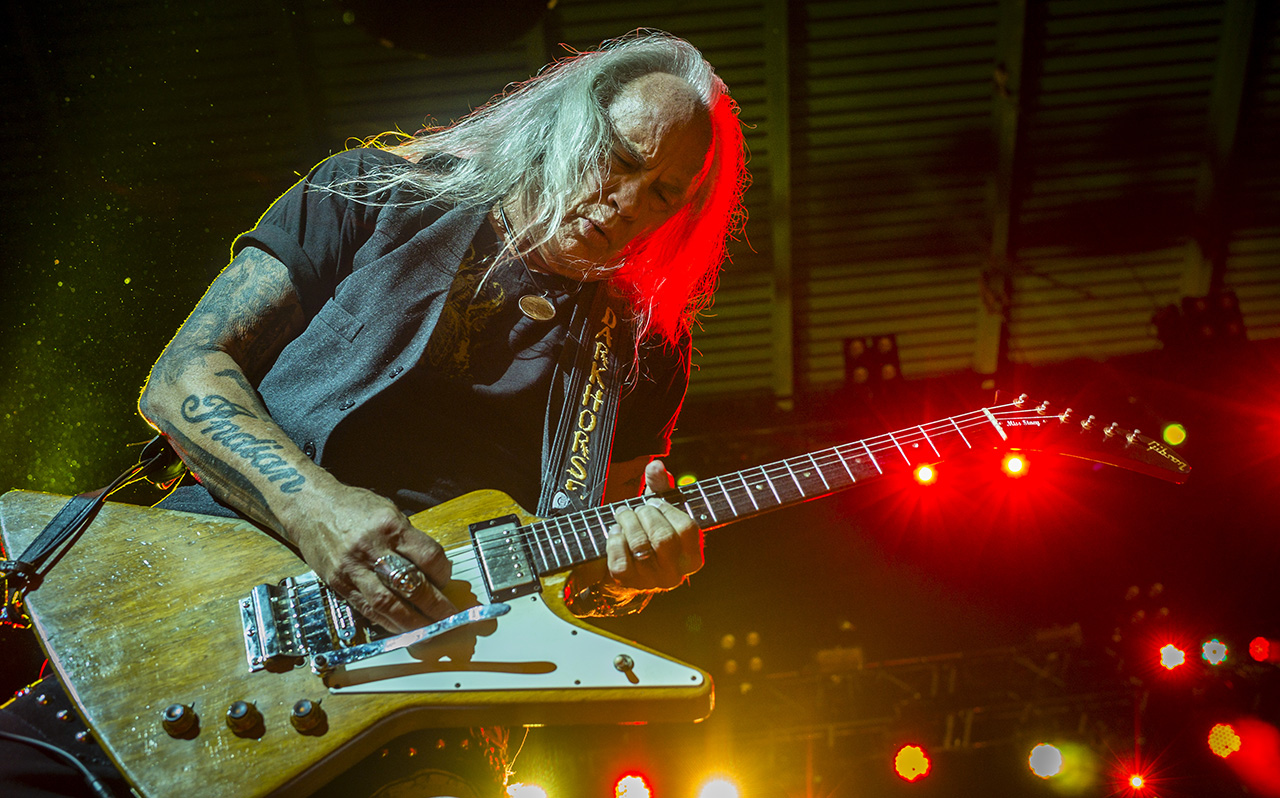“When I came back into Lynyrd Skynyrd, I knew that Free Bird was going to be my lead. I was the drummer in Muscle Shoals when we cut the original. I watched Allen. I knew the licks”: Rickey Medlocke unpacks his history with Skynyrd – and that guitar solo
Veteran guitarist (and former drummer) reveals how essential Damon Johnson has become, the secret to sounding like the late original guitarists, and the unfinished songs co-written with Gary Rossington

“Gary Rossington had this melodic sense; then there was Allen Collins with his Clapton-ish style. Put them together and they work.” That’s how Lynyrd Skynyrd guitarist Rickey Medlocke sums up the band’s ’70s guitar magic.
And he should know. It helps that he’s played guitar with Skynyrd since 1996; but before that he played drums for the Southern rock heroes from 1971 to 1972 – and was even in on the original sessions for Free Bird, among other classics.
Medlocke has been the target of more than a few shots since the ‘90s, and the 2023 death of Gary Rossington, leaving the band with no original members, has made that worse. But Medlocke responds: “This is my 28th year in the band. My whole thing is to stick with what was created. The songs are great – they’re timeless. They’ll be here after I’m gone.”
He explains: “My whole purpose in the band is to keep the integrity of this music for the fans. I promised Gary that I’d be here until the last note of Free Bird was played. I hoped he’d be here with us, but he was called away. My intention is to remain here and play what I play.”
Medlocke accepts: “A lot of people have gone back and forth about me. But there’s a video circulating that Gary made before he passed, where he says he and the guys always considered me an original guy. And my old contracts were signed under the heading of being a Lynyrd Skynyrd band member. So, I quit trying to argue. I was there in the formidable years as a band member.”
What’s your approach to covering Allen Collins’ iconic parts?
“When Gary called me in ’96 for the initial audition and wanted me to learn Saturday Night Special, That Smell and Free Bird, he said, ‘If you pass the audition, I’ll put you back in the band and give you a buck fifty and a Snickers bar.’ That was the exact call I got!
Get The Pick Newsletter
All the latest guitar news, interviews, lessons, reviews, deals and more, direct to your inbox!
“He said, ‘You’re about as close to Allen as I could possibly hope for. We’ve had other guitar players in the band, and it didn’t quite come close.’ I knew Allen’s playing; we both admired Eric Clapton. As a matter of fact, I was in the band playing drums when some of his original stuff was created and underway.”
So you felt that you had view of his playing that others didn’t?
“As far as rhythm and leads, yes. So, that was my role coming back into the band. I promised Gary that I would stick to the integrity of what Allen created. He said, ‘Rickey, you’ve played guitar long enough; if you play those songs with that kind of feel, integrity, and recreation… I want you to be happy.’
“He said, ‘If you stray a little bit, that’s up to you. You’re a guitar player; you’ve got your own thing.’ I said, ‘Well, I might stray a little bit, but nothing where anybody can go, “Wow, he’s not even on it.’’’ So that’s what I’ve been doing for nearly 30 years.”
Gary wanted me and Johnny Van Zant to know before he passed that he didn’t want the music to die with him
I’m sure you miss Gary.
“His influences went all the way back to Paul Kossoff. He admired Paul’s melodic presence and vibrato. Gary developed his own thing over the course of all the years he played nightclubs and joints, though. Even when I was playing drums with the band, I could see that the guys were really developing.”
When you were on drums, what were your observations of their developing guitar sound?
“Gary wasn’t a flashy player – he was more into a melodic sense. He created melodies within songs. He played leads that are more recognizable today than they were back then. He was underrated; I think the guy just had a uniqueness about him that worked.”

He was the last original member of Skynyrd. Has it been hard to soldier on without him?
“It’s been over a year and a half, and it’s still a raw spot. I miss the guy. I miss him being up there with me and with all of us. He was a unique person all the way around. But you know what? Such is life. We keep going.”
“Gary wanted me and [vocalist] Johnny Van Zant to know before he passed that he didn’t want the music to die with him. After he passed, Johnny and I talked; we didn’t know what we were going to do. But the fans reached out in multitudes and said, ‘Please don’t let it end here.’”
Even though you’re not considered an “original” member, you have a lineage within this genre and were a part of Skynyrd’s early history. Maybe some of the shots fired aren’t entirely fair.
“I’ve got a lot of different feelings about all that stuff. The first real slap in the face was that I wasn’t inducted into the Rock and Roll Hall of Fame with the rest of the guys. The Rock Hall claimed I wasn’t an important enough part of the band. But some band members hadn’t been there nearly as long as I had, and they got inducted.
“I look at that and wonder to myself, ‘What kind of biased and prejudicial stuff is within whoever chooses this stuff?’ But the thing is, I want to stay out of the argument, man. It’s not worth my time.”
And despite your detractors, the fans seem to be filling the seats.
“Every night, I walk out in front of that audience and play those iconic songs. That’s my Rock and Roll Hall of Fame. I take that real personal for those people, man. I’m here for them, to give them 100 percent every night, and for them to enjoy themselves and to love the legacy of that music.”
Did the band know that Gary would not have been able to continue, even if he’d lived?
“He made it known to us that he just couldn’t do it any more. He had succumbed to heart problems that were really serious; they just weakened him.”
We had a three-day rehearsal, and by the third day Damon was smokin.’ I feel very blessed he was available
And you recommended Damon Johnson to take his place, right?
“I got a call from Johnny, saying, ‘Gary is not going to be able to be with us for the upcoming shows. Does anybody come to mind that could come in and play exactly what Gary played and can mimic his tone and sound?’ Damon immediately popped into my head.
“I said, ‘Johnny, I know who could do it. He’s sitting in Nashville, and I know he can cop what Gary did.’ I said, ‘Damon Johnson,’ and Johnny said, ‘Oh my God, you’re right. Can you get a hold of him?’ I called Damon – he was really taken aback!”

He’s been touring with Skynyrd ever since. Was the chemistry there immediately?
“We had a three-day rehearsal, and by the third day, man, he was smokin.’ I feel very blessed and fortunate that he was available. I don’t know what we would have done, you know?”
What the secret to you and Damon copying the parts of two guitar legends?
“I’m playing a Gibson directly into an amp. I don’t use anything between that signal from guitar to amp. I’m playing Wizard Amps, which Damon turned me back onto. I lost my old ’71 and ’72 touring Marshall, and I had three days to get myself up and running. I called Marshall and their representatives told me, ‘No, we’re not going to be able to do that.’
“They said, ‘We’re not interested in resupplying you with amps and cabinets.’ They were more pointed toward newer, young bands, blah-blah-blah. I was thinking to myself, ‘I’ve played Marshall my whole career and you’re telling me that you’re not going to?’ I said, ‘Fine, screw it,’ I called Damon, and I got Wizard amps that sound like the old vintage Marshalls.”
How close do you and Damon get to Allen and Gary’s iconic sound?
Standing up there with Damon, it’s scary close. When Gary came out and was able to do select shows with us to play Sweet Home Alabama and Free Bird, he gave Damon his blessing to carry on. He was happy with what Damon was doing.”
From your perspective, are the fans warming up to this version of Skynyrd, just as they did when the band reformed in ’87 with new members?
“The fans thank us for not letting go of this, because it’s a legacy. We’re basically five generations into this music. We get people who are 80 coming, and it’s amazing. The other night, Johnny saw a kid who was about 11 in front of me.
“He reached down and told the security guard, ‘Pull that kid up on stage.’ The kid actually stood up there and sang Simple Man with Johnny. When you see its effect on people, you don’t let go of it; you keep pushing. Hell, man, I’ve always said, ‘If the Rolling Stones can do it, why can’t Skynyrd do it?’”
Every night I play Free Bird, the one thing I really love is the energy level it takes from within you
You’ve mentioned Free Bird a few times… what’s the most challenging thing about executing the classic guitar solo outro?
“You’re probably going to think I’m BSing you, but when I came back into the band in ’96, I knew that was going to be my lead. I was the drummer in Muscle Shoals when we cut the original Free Bird. I watched Allen; basically, he doubled it and would break off one and play something else.
“I knew the licks, so all I did was break it into sections – four bars or eight bars, whatever. We had four days of rehearsal and when the day came to play Free Bird, Gary walked in and goes, ‘Alright, today’s the day.’ I went, ‘Yup. Sure is.’”
You were confident.
“I was – I went, ‘Hell, let’s play the damn thing now.’ We rehearsed all the way through the set, got to Free Bird and started it. When the ending started, I played it on my old reverse-body Firebird. At the end of it Gary came over, shook my hand and goes, ‘Unbelievable job, Rickey. I couldn’t ask for any better.’

“I knew I was on it. And every night I play it, the one thing I really love is the energy level it takes from within you. When you get going, and your adrenaline is flowing to where it just takes over – I mean, I know what I’m doing, but it’s like my hands are on autopilot. And when it’s over, I have to snap myself back into reality.”
What does carrying on the legacy of Lynyrd Skynyrd mean to you?
“I’m thankful I’m able to be there to support Johnny and the band. I’m able to uphold the iconic songs. The legacy is very important to me. What the band created is very important to me; I want to be there to support it until the very end.
“A lot of bands go out – and this is no criticism, I’m just pointing it out – and maybe they don’t care as much any more; they just kind of go through the motions. Not this band: we can be dog-ass tired, but it does not matter. We’ll still go out and give 100 percent every night.”
Given the chemistry of the current lineup, is there a plan for Skynyrd to record its first new album since 2012’s Last of a Dyin’ Breed?
“Johnny and I have come across about two dozen songs that we wrote and recorded. These were things that Gary co-wrote; on the tapes you can hear Gary talking and laughing. Johnny and I have started talking about doing a Lynyrd Skynyrd tribute to Gary Rossington – you know, what he wrote and co-wrote. We’ll see where that goes.”
- Lynyrd Skynyrd are currently touring North America with ZZ Top.
Andrew Daly is an iced-coffee-addicted, oddball Telecaster-playing, alfredo pasta-loving journalist from Long Island, NY, who, in addition to being a contributing writer for Guitar World, scribes for Bass Player, Guitar Player, Guitarist, and MusicRadar. Andrew has interviewed favorites like Ace Frehley, Johnny Marr, Vito Bratta, Bruce Kulick, Joe Perry, Brad Whitford, Tom Morello, Rich Robinson, and Paul Stanley, while his all-time favorite (rhythm player), Keith Richards, continues to elude him.


![Lynyrd Skynyrd - Last of the Street Survivors [New Song 2020] - YouTube](https://img.youtube.com/vi/mp5u_DFTl1k/maxresdefault.jpg)



![[from left] George Harrison with his Gretsch Country Gentleman, Norman Harris of Norman's Rare Guitars holds a gold-top Les Paul, John Fogerty with his legendary 1969 Rickenbacker](https://cdn.mos.cms.futurecdn.net/TuH3nuhn9etqjdn5sy4ntW.jpg)







